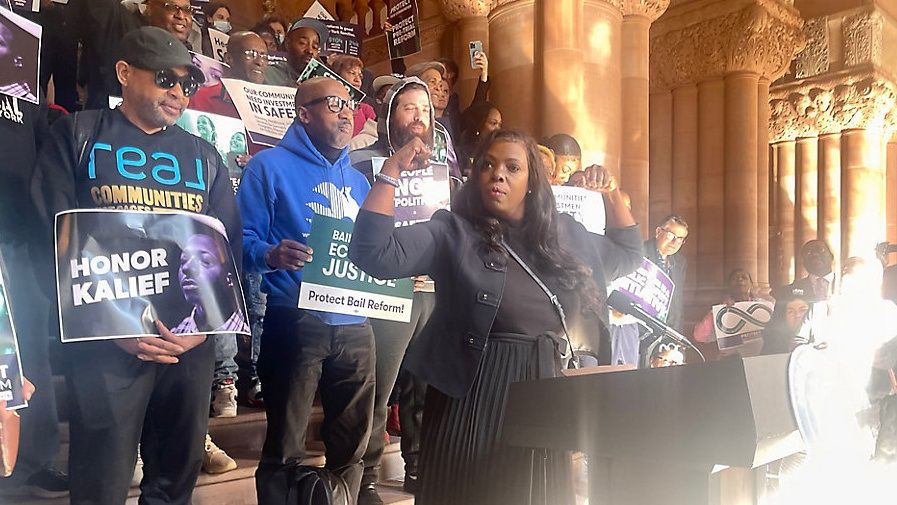The original sponsor of the 2019 pretrial discovery law said Thursday that she expects future budgets to include criminal justice rollbacks and changes to the state's evidence-sharing process.
State leaders are cleaning up language for a new compromise on discovery, the process in which the prosecution shares evidence with the defense in a criminal case.
Assemblywoman Latrice Walker said leaders have agreed on the framework of a conceptual agreement after days of working with New York City's five district attorneys, and it includes wins and losses for the Legislature.
"Not everyone is walking away with a huge smile on their face, but I am confident that the ideals of the 2019 discovery changes have been maintained," Walker, a Brooklyn Democrat, told Spectrum News 1.
Changing the law is a hard-line budget item for Gov. Kathy Hochul, who has said she won't sign a budget without closing loopholes that have led to an increase in case dismissals on technicalities. The spending plan is now 17 days past due.
The current discovery statute requires prosecutors to disclose evidence that is “related” and “relevant” to the case.
Hochul has wanted to change the law to require prosecutors only share evidence that is “relevant," but Walker said that was changed in the current agreement.
"We were grateful to not have a relevancy standard be placed on evidence that must be turned over," Walker said.
Walker argued relevancy should be determined by a judge, not the prosecution, and she's pleased the changes did not go as far as the governor's original proposal.
According to Walker, the tentative discovery agreement:
- Will not have a relevancy standard on evidence that must be shared
- Will require prosecutors to share evidence "related to the charges" of the case, and excludes statements made by the defendant or records of police misconduct
- Codifies People v. Bay, providing remedies beyond case dismissal if prosecutors prove they made a "good faith" effort to turn over all evidence
- Expected to include an element where prosecutors will have to show if turning or not turning over evidence was prejudicial to the defense
- It will not separate parts of the discovery process from the speedy trial clock
- Defense will have 35 days after a certificate of compliance is filed to challenge it
Hochul has said her proposed changes are tweaks and not a rollback of the 2019 reforms.
"All of these changes are rollbacks — I believe it is," Walker said. "...I believe that we are going backward."
Walker said she's skeptical this year's changes will have the intended impact, or resonate with voters concerned about public safety.
"We are addressing a PR issue moreso than we are addressing an issue which is sort of factually relevant," she said.
Hochul has pushed her discovery reforms over the last week with district attorneys and survivors of domestic violence who had their cases tossed out because of the current discovery process.
Walker argued there are better ways to balance public safety and protecting the civil rights of people accused of a crime, and she expects the outstanding discovery changes will be part of next year's budget debate.
"My experience has been, anything that gets left on the table, they come back for more," Walker said. "And so I do believe that we're going to be back here again next year."
Public defenders are pushing back on the current agreement.
In a statement Thursday, the Brooklyn Defenders urged Hochul to include all stakeholders in discovery negotiations, including defense attorneys and people impacted by the previous discovery statute, which increased the likelihood of wrongful convictions, and prosecutors using evidence to compel an innocent person to plead guilty.
Richmond County District Attorney Michael McMahon joined the governor to advocate for her proposal at an event in Manhattan on Wednesday. He said the amendments to the law will improve clarity for judges.
He said public defenders have been active in the ongoing conversations and have met with legislators and Hochul's office.
"When the law was passed in 2019, the district attorneys were not part of the conversation," McMahon told reporters. "I'm happy now that under the governor's leadership, under Speaker [Carl] Heastie and Leader [Andrea] Stewart-Cousins, we are part of the conversation because we are the ones charged with keeping the public safe, with keeping the criminal justice system fair and following all constitutional standards — and that's what we've been doing."


